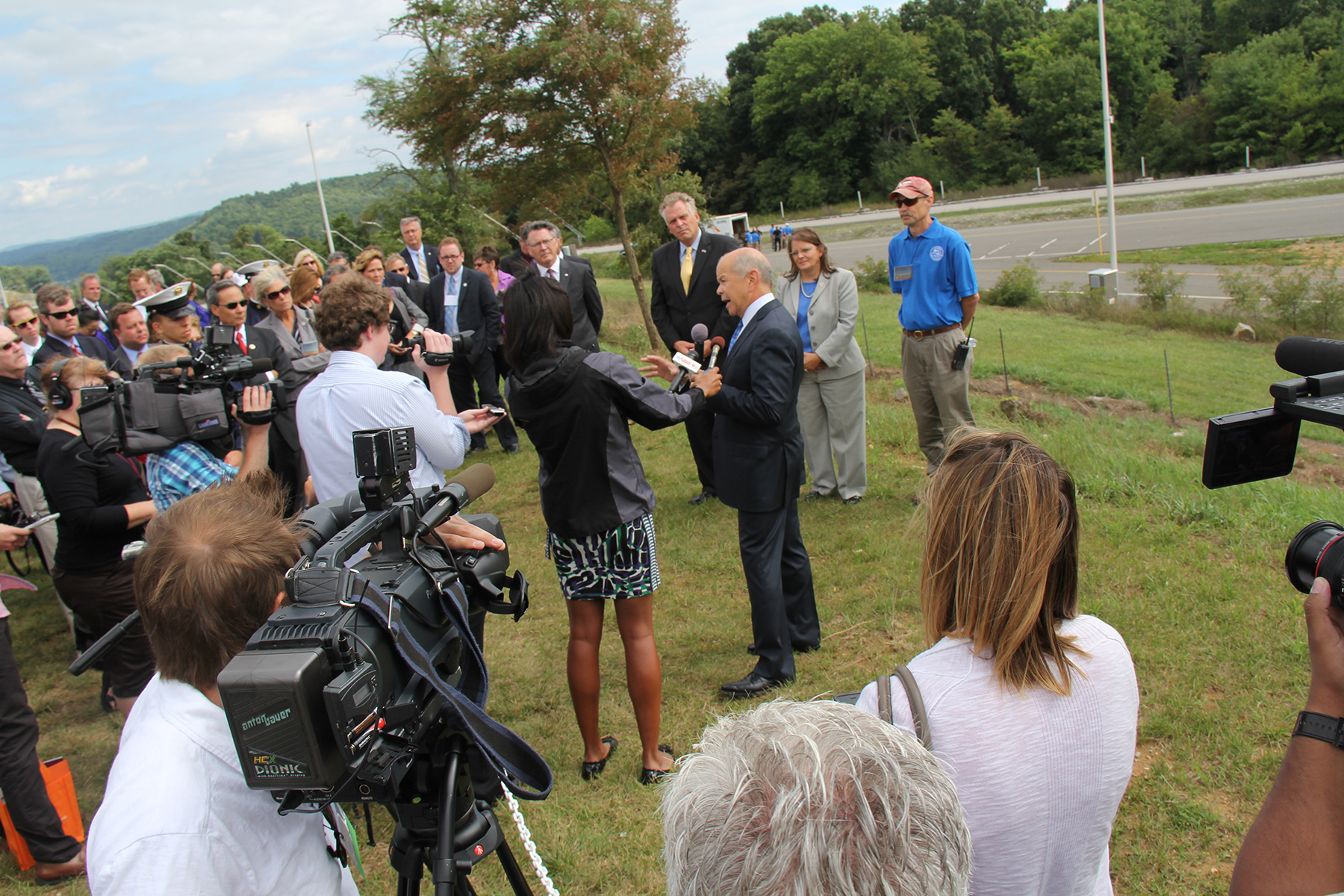Virginia Tech's unmanned aircraft test site program 'fully operational,' FAA says

The Mid-Atlantic Aviation Partnership’s Unmanned Aircraft Systems test site program is fully operational and ready to conduct research vital to integrate unmanned aircraft into the nation’s airspace, Federal Aviation Administration officials announced today.
FAA Administrator Michael Huerta joined Virginia Gov. Terry McAuliffe and leaders from Virginia, Maryland, and New Jersey at the Virginia Smart Road in Blacksburg to watch a simulation of Virginia Tech engineers using a multirotor, unmanned aircraft to gather information at a mock accident scene on an interstate highway.
The helicopter was specially modified for transportation research by Kevin Kochersberger, a research associate professor with College of Engineering and the Virginia Center for Autonomous Systems, along with mechanical engineering students from the Unmanned Systems Laboratory at Virginia Tech.
“We are transitioning new types of aircraft into the nation’s skies that have tremendous potential to help people and create new industry,” said Virginia Tech President Timothy D. Sands. “Unmanned aircraft will be useful for agriculture, search-and-rescue missions, disaster response, research, and innovations. With the onset of a new technology, industries are born and new infrastructure evolves — the economic impacts will be enormous.”
The FAA granted Virginia Tech seven Certificates of Waiver or Authorization for two-years.
The Mid-Atlantic Aviation Partnership is headquartered within the Institute of Critical Technology and Applied Science at Virginia Tech. Its test range comprises air space in Virginia, New Jersey, and Maryland.
“We’ve refined our procedures with low-risk flights and are about to take it to the next level with larger, faster, and higher flying aircraft,” said Rose Mooney, the executive director of the Mid-Atlantic Aviation Partnership. “Our goal is to make sure unmanned aircraft operations are safe to operate with manned aircraft.”
Nearby, a model of a drastically different aircraft, the Aurora Flight Sciences’ Centaur Optionally Piloted Aircraft, was on display. At 28-feet long with a 44-foot wingspan, it is roughly the size of a private plane. But it can fly for more than 2,000 miles with or without a pilot on board.
MAAP officials hope to fly the aircraft for its first flight in controlled airspace at the NASA Wallops Flight Facility on the eastern shore of Virginia this fall.
“Early in this process, the Commonwealth of Virginia realized how vital unmanned aircraft systems testing is for building a new Virginia economy focused on innovation, diversification, and new technology that will enable Virginia to compete on a global scale,” said Gov. Terry McAuliffe. “We publically pledged support to this effort, and then backed up those words with funding. It is gratifying to see our work has made the mid-Atlantic region a leader in unmanned aircraft system research.”
The FAA selection of Virginia Tech, with academic partner Rutgers University, and the later addition of the University of Maryland, along with more than 120 industry partners, was announced on Dec. 30 after a rigorous 10-month selection process involving 25 proposals from 24 states.
With support from the Commonwealth of Virginia and the Institute for Critical Technology and Applied Science, the partnership has been building infrastructure for private companies and other organizations to develop unmanned aircraft, commonly referred to as drones.
Introducing commercial unmanned aerial vehicles to U.S. skies could add more than $13.6 billion to the national economy by the end of the decade, with totals reaching as high as $82.1 billion by 2025, according to the Association for Unmanned Vehicle Systems International.
The Virginia Smart Road, the site of Wednesday’s demonstration, is a 2.2 mile, limited-access road used for testing new transportation technologies.
It is owned and maintained by the Virginia Department of Transportation and managed by the Virginia Tech Transportation Institute, which brings research, safety, and policy expertise to the development of connected and driverless vehicle technologies.
Dedicated to its motto, Ut Prosim (That I May Serve), Virginia Tech takes a hands-on, engaging approach to education, preparing scholars to be leaders in their fields and communities. As the commonwealth’s most comprehensive university and its leading research institution, Virginia Tech offers 240 undergraduate and graduate degree programs to more than 31,000 students and manages a research portfolio of $513 million. The university fulfills its land-grant mission of transforming knowledge to practice through technological leadership and by fueling economic growth and job creation locally, regionally, and across Virginia.







